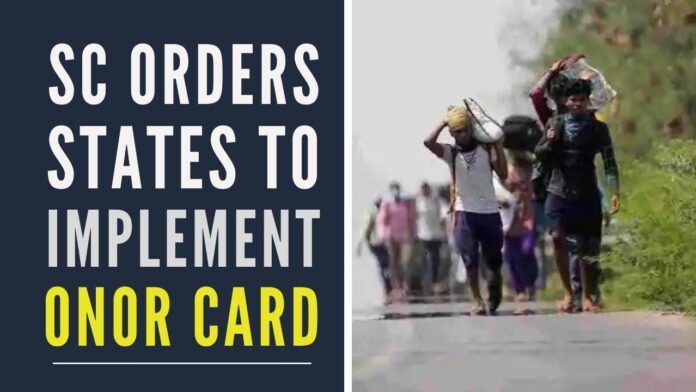
SC orders states to implement the One Nation One Ration Card
The Supreme Court’s 80-page Judgment delivered by the Bench comprising Justices Ashok Bhushan and M R Shah on Tuesday exposes the apathy and lackadaisical attitude of Centre and many State Governments in handling the tragedy and suffering of migrant labour and un-organised labour workforce during COVID-19 pandemic lockdown days starting from the last week of March 2020. The apex court gave an ultimatum to all non-implementing States – Chhattisgarh, West Bengal, Assam and Delhi – to implement the One Nation One Ration Card (ONORC) by July 31. The Bench also ordered several slew of measures for the migrant and unorganized labour suffering after the COVID-19 Lockdown. The measures include implementing a community kitchen, national database. The Judgment also slammed the Centre for “unpardonable”, “apathy and lackadaisical attitude” towards creating National Database for Unorganised Workers (NDUW) and ordered its commencement by December 31 so that all migrant workers are registered this year and welfare measures extended to them during Covid distress.
Expressing displeasure at the Labour Ministry of Central Government, the top court ordered that the database has to be prepared by December 31. The Judgment reveals that already Rs.417 crore was released for creating the national portal and Judges observed that even modules of the database are not ready.[1]
The verdict, which was critical of the delay in creating NDUW, directed the Centre to develop the Portal in consultation with National Informatics Centre (NIC).
The Centre pointed out that Chhattisgarh, West Bengal, Assam and Delhi have not implemented the One Nation One Ration Card (ONORC) scheme which helps in availing free ration at the place of work. “…the States, who have not yet implemented ‘One Nation One Ration Card’ scheme are directed to implement the same by not later than July 31,” said the 80-page Judgment criticizing Centre and many States for apathy and delays in implementing welfare measures to migrant and unorganized labour during the pandemic.[2]
The top court referred to its order of August 21, 2018, directing the Ministry of Labour to make available a module to states and UTs for the registration of unorganised workers and said the stand was taken by the Centre “does not commend us”. “When the unorganized workers are waiting for registration and are waiting to reap the benefit of various welfare schemes of the States and Centre, the apathy and lackadaisical attitude by the Ministry of Labour and Employment is unpardonable. There was urgency in the portal to be finalized and implemented looking to the pandemic and dire need of unorganized workers to receive the benefit.
“The attitude of Ministry of Labour and Employment in not completing the module even though directed as early as on 21.08.2018 shows that Ministry is not alive to the concern of the migrant workers and the non-action of the Ministry is strongly disapproved,” it said. The bench also directed the labour secretary to ensure that the NDUW portal is finalised and implementation of the portal commences on or before July 31 and sought a compliance report within a month thereafter.
The verdict, which was critical of the delay in creating NDUW, directed the Centre to develop the Portal in consultation with National Informatics Centre (NIC). “We also impress upon and direct that the process of registration of the unorganized labourers/ migrant workers is completed at the earliest, but no later than 31.12.2021,” it said. The Court had noted that about Rs.417 crore had been disbursed for the making of the database and expressed its displeasure at the snail’s pace in which they work on the same was progressing.
“What is your project for National Database of Unorganised Workers? Rs.417 crores have been released but not even a module is created. How much time will you take? The process has not even started,” the Court had asked. The verdict directed states, UTs and the Licence Holders or contractors to cooperate with the Centre to complete the process of registration of migrant workers and unorganized labourers for welfare schemes.
The apex court directed the Department of Food and Public Distribution to “allocate and distribute foodgrains as per the demand of additional food-grains from the States for disbursement of dry food grains to migrant labourers.” “We direct the States to bring in place an appropriate scheme for distribution of dry ration to migrant labourers for which it shall be open for states to ask for allocation of additional food grains from the Central Government, which, as directed…Shall provide the additional food grains to the State,” it ordered, adding that it has to be brought by July 31 and maybe continued till the current pandemic exists.
The Judgment also directed States and Union Territories to run community kitchens at prominent places for feeding those who do not have sufficient means. The top court referred to the worldwide awareness over the right to food of human beings and said that the fundamental right to life under Article 21 may include this right as well.
“There has been worldwide awareness regarding the right to food to the human beings. Our country is no exception. Lately, all Governments have been taking steps and taking measures to ensure that no human being should be affected by hunger, and no one dies out of hunger. The basic concept of food security globally is to ensure that all people, always, should get access to basic food for their active and healthy life.
“The Constitution of India does not have any explicit provision regarding the right to food. The fundamental right to life enshrined in Article 21 of the Constitution may be interpreted to include the right to live with human dignity, which may include the right to food and other basic necessities,” it said.
Three activists, Anjali Bharadwaj, Harsh Mander and Jagdeep Chhokar, had filed the plea seeking directions to the Centre and states to ensure food security, cash transfers and other welfare measures for migrant workers who faced distress again due to curfews and lockdowns in various parts of the country during the second wave of COVID-19.
References:
[1] [Suo Motu Migrant Crisis] Supreme Court directs States to implement One Nation, One Ration Scheme – Jun 29, 2021, Bar and Bench
[2] Migrant workers suo motu case: Supreme Court sets July 31 deadline for states on one nation, one ration card, for Centre to set up worker registration portal – Jun 29, 2021, India Legal
- Supreme Court rejects plea to tally all VVPAT slips with EVM votes; says ‘no going back to paper ballot’ - April 26, 2024
- US report citing human rights violations is deeply biased: India - April 25, 2024
- Kotak Mahindra Bank shares tank 13%. Market Cap erodes by Rs.37,721 cr post-RBI action - April 25, 2024











[…] of the humanist judges, Justice Ashok Bhushan bid farewell to Supreme Court on June 30 after delivering two welfare-centric judgments to those […]
[…] The Supreme Court Judgment exposes apathy and lackadaisical attitude of Centre and States in handlin… – Jun 29, 2021, […]